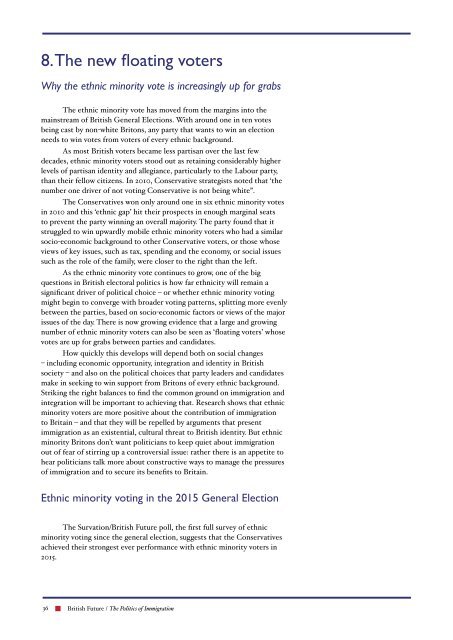THE POLITICS OF IMMIGRATION
The-politics-of-immigration
The-politics-of-immigration
Create successful ePaper yourself
Turn your PDF publications into a flip-book with our unique Google optimized e-Paper software.
8. The new floating voters<br />
Why the ethnic minority vote is increasingly up for grabs<br />
The ethnic minority vote has moved from the margins into the<br />
mainstream of British General Elections. With around one in ten votes<br />
being cast by non-white Britons, any party that wants to win an election<br />
needs to win votes from voters of every ethnic background.<br />
As most British voters became less partisan over the last few<br />
decades, ethnic minority voters stood out as retaining considerably higher<br />
levels of partisan identity and allegiance, particularly to the Labour party,<br />
than their fellow citizens. In 2010, Conservative strategists noted that ‘the<br />
number one driver of not voting Conservative is not being white”.<br />
The Conservatives won only around one in six ethnic minority votes<br />
in 2010 and this ‘ethnic gap’ hit their prospects in enough marginal seats<br />
to prevent the party winning an overall majority. The party found that it<br />
struggled to win upwardly mobile ethnic minority voters who had a similar<br />
socio-economic background to other Conservative voters, or those whose<br />
views of key issues, such as tax, spending and the economy, or social issues<br />
such as the role of the family, were closer to the right than the left.<br />
As the ethnic minority vote continues to grow, one of the big<br />
questions in British electoral politics is how far ethnicity will remain a<br />
significant driver of political choice – or whether ethnic minority voting<br />
might begin to converge with broader voting patterns, splitting more evenly<br />
between the parties, based on socio-economic factors or views of the major<br />
issues of the day. There is now growing evidence that a large and growing<br />
number of ethnic minority voters can also be seen as ‘floating voters’ whose<br />
votes are up for grabs between parties and candidates.<br />
How quickly this develops will depend both on social changes<br />
– including economic opportunity, integration and identity in British<br />
society – and also on the political choices that party leaders and candidates<br />
make in seeking to win support from Britons of every ethnic background.<br />
Striking the right balances to find the common ground on immigration and<br />
integration will be important to achieving that. Research shows that ethnic<br />
minority voters are more positive about the contribution of immigration<br />
to Britain – and that they will be repelled by arguments that present<br />
immigration as an existential, cultural threat to British identity. But ethnic<br />
minority Britons don’t want politicians to keep quiet about immigration<br />
out of fear of stirring up a controversial issue: rather there is an appetite to<br />
hear politicians talk more about constructive ways to manage the pressures<br />
of immigration and to secure its benefits to Britain.<br />
Ethnic minority voting in the 2015 General Election<br />
The Survation/British Future poll, the first full survey of ethnic<br />
minority voting since the general election, suggests that the Conservatives<br />
achieved their strongest ever performance with ethnic minority voters in<br />
2015.<br />
36 British Future / The Politics of Immigration


